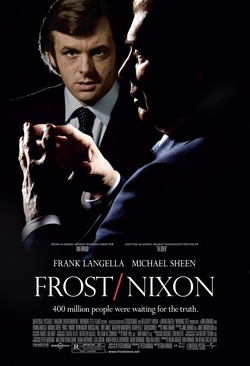
Frost/Nixon portrays the Nixon Interviews of 1977 between former President Richard Nixon and British talk show host David Frost. It is prominent because it was the first public interview by Nixon after his 1974 resignation. Because of the blanket pardon provided by his successor, President Gerald Ford, there was no investigation, trial or finding as to his guilt, and the U.S. was still suffering from turmoil in the aftermath of Watergate and the end of the Vietnam war as public confidence in government and public service was at a low.
The actual interviews were best known as the point where Nixon stated the philosophy "Well, when the president does it, that means that it is not illegal." The actual interviews are discussed in many places. This is about the movie.
The movie is not as much about the content of the interviews (although the interviews were the point) as it is about the two people involved and their cornermen (i.e. principle staff). You have Frost, who is more of a TV personality rather then a tough reporter, and Nixon, an experienced politician. For Frost, this was an opportunity to do something unique and special, incidentally trying to save a career that is looking like it will fall into banality. Nixon was a politician who missed the give and take of dealing that went with political life and wanted the opportunity to rehabilitate his place in history. For the people behind Frost, they wanted the opportunity to represent their generation in uncovering the truth of the events that ripped the heart out of the country, and Nixon was the demon that needed to be faced, with Frost being the very unlikely and not very qualified demon confronter. Nixon's staff viewed Frost as a lite-weight pushover.
The movie focused on the evolution of Frost in this environment. In one of the DVD special features, one of Frost's staff depicted in the movie describes how he never realized about how compressing TV was, that for everything done, TV has a way of focusing attention on one moment to the exclusion of everything. And that as bad as he felt most of the interview was, a single moment (a shot of Nixon during the interview described as grief and pain and self-loathing) saved the rest. The movie shows it this way as well, with Frost almost distracted in the midst of the interviews by the need to court investors and sponsors as opposed to preparing for the interviews, until the one focused on Watergate, which turned into the equivalent of a finals cram session as Frost prepared with an intensity he did not before.
What was good? You can see the issues of hubris. The most obvious one is Nixon and his team, confident that the inteligent Nixon can snow the pushover Frost. But also from Frost's side, who had the view that his role was to provide entertainment and a show. (Note: this was dramatic license. In reality, David Frost was a competent interview as needed, and his choice of staff was intended so he could be hard hitting, his previous interview with Nixon in the 60s aside. The idea that you can find a particular transcript that may or may not exist in courthouse records and integrate it into a TV interview in a couple days is not believable, or true.) And the purpose of the preparation was only that. And the turning point was when one side realized his hubris, which was Frost.
This is not a documentary, rather a dramatic work around a historical event. And its goal was the pointing out the effects of hubris on man, even those who could truly deserve the label great. So it was for many of the time and events in question. And, history shows, many other times and places.
No comments:
Post a Comment